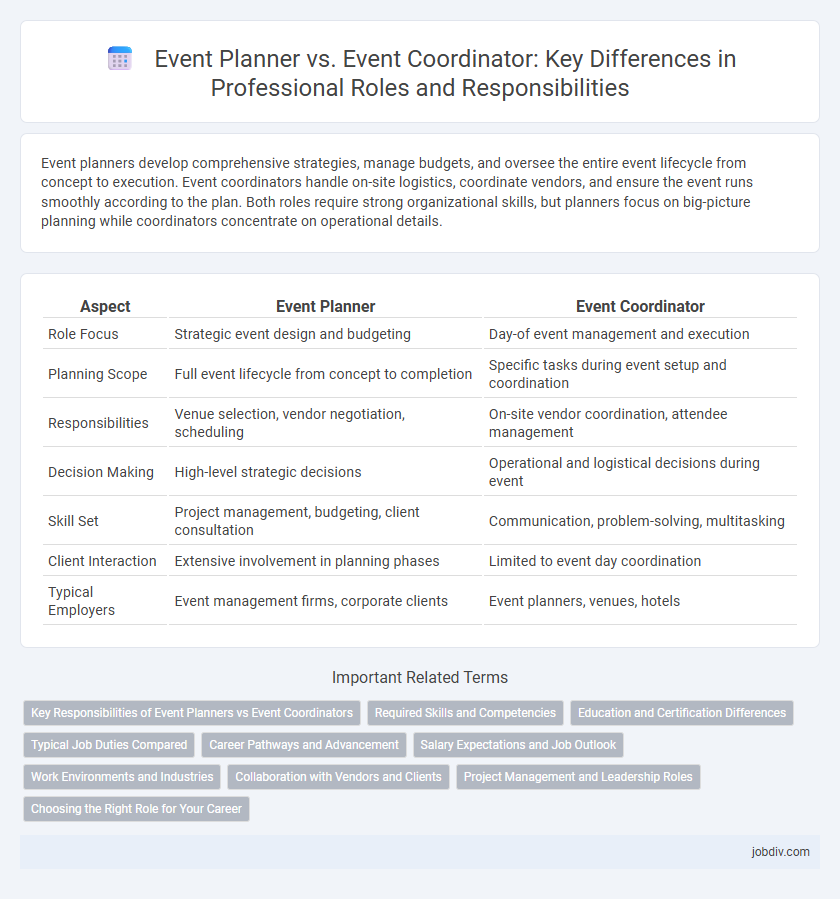Event planners develop comprehensive strategies, manage budgets, and oversee the entire event lifecycle from concept to execution. Event coordinators handle on-site logistics, coordinate vendors, and ensure the event runs smoothly according to the plan. Both roles require strong organizational skills, but planners focus on big-picture planning while coordinators concentrate on operational details.
Table of Comparison
| Aspect | Event Planner | Event Coordinator |
|---|---|---|
| Role Focus | Strategic event design and budgeting | Day-of event management and execution |
| Planning Scope | Full event lifecycle from concept to completion | Specific tasks during event setup and coordination |
| Responsibilities | Venue selection, vendor negotiation, scheduling | On-site vendor coordination, attendee management |
| Decision Making | High-level strategic decisions | Operational and logistical decisions during event |
| Skill Set | Project management, budgeting, client consultation | Communication, problem-solving, multitasking |
| Client Interaction | Extensive involvement in planning phases | Limited to event day coordination |
| Typical Employers | Event management firms, corporate clients | Event planners, venues, hotels |
Key Responsibilities of Event Planners vs Event Coordinators
Event planners oversee the entire event process, including budget management, vendor negotiations, and overall strategic planning to ensure event goals are met. Event coordinators focus on executing specific event details, such as managing schedules, coordinating onsite logistics, and handling real-time problem-solving during the event. Both roles require strong organizational skills, but planners engage in high-level project management while coordinators ensure flawless day-of-event operations.
Required Skills and Competencies
Event planners require strong strategic planning, budgeting, and vendor management skills to design and execute comprehensive event concepts. Event coordinators excel in logistical coordination, on-site problem-solving, and effective communication to ensure the smooth operation of event details. Both roles demand exceptional organizational abilities and proficiency in time management to meet client expectations and deliver successful events.
Education and Certification Differences
Event Planners typically hold a bachelor's degree in hospitality management, marketing, or communications, while Event Coordinators often require only a high school diploma or associate degree combined with hands-on experience. Certification programs such as the Certified Meeting Professional (CMP) or Certified Special Events Professional (CSEP) are more commonly pursued by Event Planners to demonstrate advanced knowledge and professionalism. Event Coordinators may obtain entry-level certifications like the Certified Event Organizer (CEO) credential to validate foundational skills in event logistics.
Typical Job Duties Compared
Event planners oversee the entire event process, including budgeting, vendor negotiations, and client consultations, ensuring the event aligns with strategic goals. Event coordinators focus on the day-to-day logistics, managing schedules, venue setup, and on-site problem-solving to execute the event smoothly. Both roles require strong organizational skills, but planners emphasize project management and client relations while coordinators prioritize operational details.
Career Pathways and Advancement
Event planners typically manage the overall strategic vision and client relationships, positioning themselves for senior roles such as event director or marketing manager. Event coordinators focus on the logistical execution of events, often advancing to lead coordinator or project manager positions within specialized sectors. Career pathways for both roles demand strong organizational skills and adaptability, with advancement opportunities influenced by experience, industry connections, and proficiency in event technologies.
Salary Expectations and Job Outlook
Event planners typically earn higher salaries than event coordinators due to their broader responsibilities, with average annual salaries ranging from $50,000 to $70,000 compared to $35,000 to $50,000 for coordinators. The job outlook for event planners is projected to grow by 7% over the next decade, driven by increased corporate events and social gatherings, while event coordinators are expected to experience a steadier growth rate of around 5%. Professionals seeking career advancement in event management should consider the planner role for greater earning potential and expanded industry opportunities.
Work Environments and Industries
Event planners typically operate in diverse industries such as corporate, non-profit, and entertainment sectors, managing large-scale events from concept to completion, often working in office settings or on-site venues. Event coordinators usually support specific event components within hospitality, conference centers, and wedding industries, frequently engaging in hands-on tasks at event locations. Both roles require adaptability to various environments, but planners focus on strategic oversight while coordinators handle day-to-day event logistics.
Collaboration with Vendors and Clients
Event planners develop strategic partnerships with vendors and clients to design comprehensive event concepts that align with objectives and budget constraints. Event coordinators manage vendor communications and logistics on the event day, ensuring seamless execution and adherence to timelines. Both roles require strong negotiation skills and the ability to foster collaborative relationships to achieve successful event outcomes.
Project Management and Leadership Roles
Event planners oversee the entire project management lifecycle of an event, including budgeting, scheduling, vendor negotiations, and client communications, demonstrating strong leadership in guiding cross-functional teams. Event coordinators focus on executing specific tasks within the plan, managing on-site logistics, and ensuring smooth operational flow, supporting the planner's strategic vision. Effective leadership in event planning requires strategic decision-making and stakeholder management, while coordination demands detailed operational control and team collaboration.
Choosing the Right Role for Your Career
Event planners oversee the strategic vision and overall execution of events, managing budgets, client relations, and vendor coordination to ensure seamless experiences. Event coordinators focus on the logistical details during the event, such as scheduling, setup, and on-site management, ensuring all elements run smoothly on the day. Choosing between these roles depends on your preference for long-term project leadership versus hands-on operational responsibilities in the event industry.
Event Planner vs Event Coordinator Infographic

 jobdiv.com
jobdiv.com